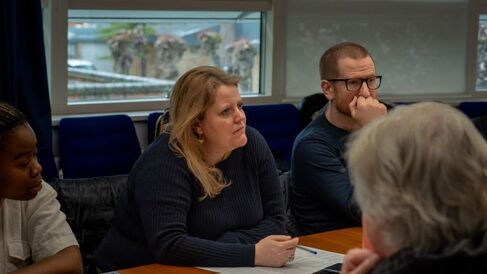Postgraduate study

Within the Faculty of Divinity at the University of Cambridge, the Cambridge Interfaith Programme team contribute to masters-level teaching including courses focused on Religion and Conflict, the study of World Religions, and World Christianities.
Some colleagues are also available to supervise advanced research students working towards a doctorate. For those new to Cambridge, it is advisable to begin with an MPhil degree in a related specialism. This gives chance for you to develop and test your research acumen and gather knowledge relevant to your chosen specialism.
The Faculty also offers an Advanced Diploma, with the chance to take four undergraduate papers as a taster for further study. The choice of papers is broad and includes many of those listed in our information about undergraduate study.
Research Forum
Through the Cambridge Interfaith Research Forum, CIP supports postgraduates with religious and inter-religious interests. The Forum offers targeted opportunities, including skills sessions, mailing lists, and a small grant scheme. Membership is open to students from all parts of the University. Learn more about the Research Forum.
Visiting students
It is also possible for postgraduate students from other universities to spend up to a year as a visiting student in Cambridge. Visiting students are welcome to join local students in attending the Inter-Religious Research Seminars and other events organised by the Cambridge Interfaith Programme—including termly introductions to Scriptural Reasoning.
View different MPhil pathways on the Faculty of Divinity’s website (divinity.cam.ac.uk).
Learn about the Advanced diploma (divinity.cam.ac.uk)
Example: The MPhil pathway in Religion & Conflict
This distinctive programme allows for full time or part time study in Cambridge.
Modules on offer vary from year to year. They may include:
Theories and Issues in the Study of Religion and Conflict
Introducing the critical study of religion and conflict by scrutinising current theoretical debates about the place of religion in a variety of forms of conflict, from genocide to domestic violence, and by closely analysing indicative and emblematic scriptural, historical, and contemporary case studies.
Contemporary Religious Conflict: Ethnographic Approaches
Case studies include the Exclusive Brethren, a socially separatist religious group anticipating imminent apocalypse; the Protestant commitments of the Orange Order and other loyalist groups active in Scotland, and their connection to Northern Ireland; racism and Islamophobia as religious expressions within certain white-majority communities in Britain; and American Protestant Fundamentalism.
Antisemitism, Islamophobia, and ‘Christian Europe’
European Christendom has been marked by two notable forms of hatred: antisemitism/anti-Judaism and Islamophobia. This co-taught module explores both phenomena independently, as well as in relation to one other.
Interested to learn more?
For detailed information about study in the Faculty of Divinity, please visit the Faculty website. The following pages will be relevant to most enquiries:
